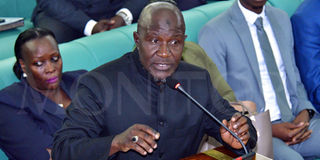Prime
Rights body denounces ‘unconstitutional’ anti-homosexuality Bill

Bugiri Municipality Member of Parliament, Asuman Basalirwa during the plenary session at Parliament in Kampala, on February 28, 2023. PHOTO/DAVID LUBOWA
What you need to know:
- On March 9, Bugiri Municipality MP Asuman Basalirwa tabled the Bill for first reading, marking a significant step in the enactment of the controversial law. The Bill is now before the Committee of Legal and Parliamentary Affairs for scrutiny. This followed clearance by the Finance Ministry, which issued a Certificate of Financial Implication (CFI).
Parliament should abandon plans to enact an anti-homosexuality law, a leading human rights organisation has said in a report that casts doubt on the constitutionality and relevance of the move.
The Bill, if enacted into law, would violate the Constitution, which guarantees and protects key human rights, including the non-derogable rights to dignity and freedom from torture, inhuman and degrading treatment, and the right to a fair hearing, Human Rights Awareness and Promotion Forum (HRAPF) argues in a detailed legal and human rights analysis of the Anti-Homosexuality Bill, 2023.
Human Rights Watch, in a statement, warned that if adopted, the law would violate multiple fundamental rights, including the rights to freedom of expression and association, privacy, equality, and non-discrimination.
HRAPF says the Bill constitutes a significant step backward for Uganda’s battle against child sexual abuse and HIV/Aids.
“If Parliament wants more laws to protect children from sexual abuse, as well as to address sexual violence generally, a non-discriminatory law would be the way to go, that is, a law that protects all persons regardless of their sexual orientation and gender identity. Such a law would only criminalise non-consensual sexual relationships. This is the law that would protect children and victims more,” the report notes.
On March 9, Bugiri Municipality MP Asuman Basalirwa tabled the Bill for first reading, marking a significant step in the enactment of the controversial law. The Bill is now before the Committee of Legal and Parliamentary Affairs for scrutiny. This followed clearance by the Finance Ministry, which issued a Certificate of Financial Implication (CFI).
House Speaker Anita Among has stated that the Anti-Homosexuality Bill, 2023, will be expeditiously processed at ‘whatever cost’ but activists say Article 79(1) of the 1995 Constitution does not give Parliament powers to pass laws that contravene the Constitution.
HRAPF recommends that there is no need for the Bill as the provisions are all already existing in other laws, including the criminalisation of same-sex relationships.
The hurdles in implementing the existing law, they say, will still be the same hurdles affecting the implementation of the new laws.
“It is a waste of resources and time to legislate on something that is already legislated upon,” the body argues.
The organisation has urged civil society actors and partners, including other governments and UN mechanisms, to engage Parliament and other organs of the government not to enact this law.
“One of the most extreme features of this Bill is that it criminalises people simply for being who they are, as well as further infringing on the rights to privacy, and freedoms of expression and association that are already compromised in Uganda,” Mr Oryem Nyeko, a researcher at Human Rights Watch, said, adding, “Ugandan politicians should focus on passing laws that protect vulnerable minorities and affirm fundamental rights and stop targeting LGBT [lesbian, gay, bisexual, and transgender] people for political capital.”
Background
The Anti-Homosexuality Bill, 2023, was published in the Uganda Gazette on March 3. In a motion in which he was granted leave of the House, Bugiri Municipality MP Asuman Basalirwa, noted that homosexuality “contravenes the order of nature, our cultural and religious norms and poses a threat to the stability and survival of the family.” He continued that the existing laws were not adequate to address “this creeping evil.” He described homosexuality as a “cancer” eating up the world that needed to be addressed through legislation.




